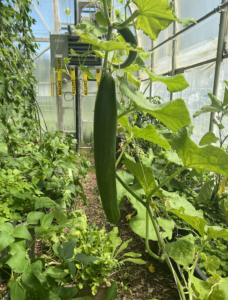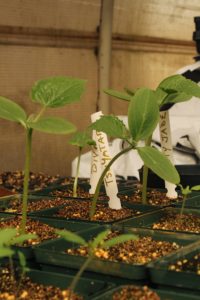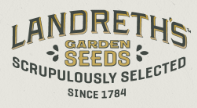Cucumber
Cucumber Suppliers
Landreth’s place in history includes so much more than what was planted in the ground. The company also created tools and machines to work the soil for optimal sowing and growing. Landreth pioneered the first grain and seed threshers, built some of the first mowers, reapers, plows, and corn shellers, and, in 1872, developed the first steam-powered tractor for plowing fields. In addition, David Landreth himself published the first floral and horticultural magazine in Philadelphia, and also served as the president of the U.S. Agricultural Society for several terms.
For over 230 years, D. Landreth Seed Company has grown the crops that have built our nation, and we plan to be here for generations to come. From the early days of our country's first farmers to the modern times of farm and garden to table, we have remained your trusted source for the most reliable seeds…as well as your go-to resource for all the growing guides, planting advice, and gardening encouragement you need. We've known, sown, and grown our seeds for centuries, and our assortment reflects those we've scrupulously selected to ensure your gardening success. Sow, grow, know, and most importantly, have fun digging in! We're here for you every step of the way.
Cucumber Pests & Diseases
- Texas A&M - Cantaloupe, Cucumber, Squash, Pumpkin and Crenshaw | Texas Plant Disease Handbook
- Clemson University - Cucumber, Squash, Melon & Other Cucurbit Insect Pests | Home & Garden Information Center
- Penn State - Cucumber | Diseases and Pests, Description, Uses, Propagation
- North Carolina State University - Pests of Cucurbits | NC State Extension Publications
Cucumber Growing Guides
- University of California - Growing Cucumbers - UC Botanical Garden
- University of Minnesota - Growing cucumbers in home gardens | UMN Extension
- Texas A&M - How to Grow Cucumbers - growing cucumbers in a trellis or cage
- Penn State - Cucumber | Diseases and Pests, Description, Uses, Propagation
- Garden Savvy - How to Grow Cucumber
Cucumbers are an amazing delicious vegetable. They originated in India but were spread through Europe by the ancient Greeks and Romans. Cucumbers are related to both watermelons and squash and have been cultivated for thousands of years. The longer kinds are usually known as slicing cucumbers, and the shorter ones as pickling cucumbers (for making pickles!), although both types can often be used either way.

Cucumbers are an amazing delicious vegetable. They originated in India but were spread through Europe by the ancient Greeks and Romans. Cucumbers are related to both watermelons and squash and have been cultivated for thousands of years. The longer kinds are usually known as slicing cucumbers, and the shorter ones as pickling cucumbers (for making pickles!), although both types can often be used either way. Another set of cucumber varieties is called burpless cucumbers. These have sweeter and usually thinner skin that has reduced levels of the chemical Cucurbitacin. This naturally occurring chemical increases the bitter taste of the skin and may cause some stomach gas. These don’t need to be peeled, are often seedless, and are pretty popular due to the sweeter taste. All cucumbers are vine-type vegetables, although several individual hybrid varieties have been bred to grow on bushes.
 Slicing, pickling, and burpless cucumbers are all commonly grown in gardens. “Slicers” are long and have thick skins, and are usually peeled and sliced into salads. They have a sweet taste, though the skins can be a bit bitter if unpeeled. In the grocery store you will often see these waxed to preserve freshness, and peeling them is the most common way to serve them, both to remove the wax and the bitterness. Pickling cucumbers are also grown in gardens. These are generally shorter, and many are bred to have thinner (or drier) skins to allow for easier pickling. Many of the longer varieties are harvested early for pickling purposes, or pickled after slicing. Burpless pickles are much sweeter and are served raw and as is. These are often cut up (unpeeled!) for cucumber salads or other recipes.
Slicing, pickling, and burpless cucumbers are all commonly grown in gardens. “Slicers” are long and have thick skins, and are usually peeled and sliced into salads. They have a sweet taste, though the skins can be a bit bitter if unpeeled. In the grocery store you will often see these waxed to preserve freshness, and peeling them is the most common way to serve them, both to remove the wax and the bitterness. Pickling cucumbers are also grown in gardens. These are generally shorter, and many are bred to have thinner (or drier) skins to allow for easier pickling. Many of the longer varieties are harvested early for pickling purposes, or pickled after slicing. Burpless pickles are much sweeter and are served raw and as is. These are often cut up (unpeeled!) for cucumber salads or other recipes.
Unpeeled cucumbers are very low in calories, and high in magnesium and potassium, as well as vitamins C and K. They are also high in antioxidants, which help your body fight disease. The peels are nutritious but the waxed cucumbers can hold contaminants, so growing your own may be a good way to ensure good nutrition. Burpless cucumbers do have the same nutrition as other garden cucumbers.
- Cucumber: Cucumis sativus
- Annual
- Full sun
- Soil acidity should be mildly acidic (6.0-6.8 pH)
- Well-drained, fertile soil
- Seeds starting:
1″ deep
12-18” spacing if trellised, 3 to 5 feet spacing if not trellised
- Transplants:
3” deep
Spacing as above
- Climate Zones 4-12
There are a huge number of cucumber varieties within these groups. American garden cucumbers are one of the most common slicers. These are long, smooth-skinned, and green, these are found in home gardens and farmer’s markets, and grocery stores everywhere. English cucumbers are a burpless variety, good for slicing, and they have a very mild, sweet flavor, but are not good for pickling. Kirby cucumbers are the pickling sort, short and crunchy. They can also be cut up for salads, though! These are just a few of a huge number of cucumber types.
Cucumbers grow most commonly on vines. A trellis is the best way to grow this kind. A simple trellis 12 to 18 inches wide, and made from a wire fence, will allow the vine to grow best. Plant one vine for each trellis, they can be quite close to each other this way. Good, well-drained and composted soil is best, with full sun and regular watering throughout the growth cycle. Cucumbers can be directly seeded in the garden about two weeks after the last frost, or seedlings can start about 4-6 weeks before the last frost, and can be transplanted at the same time, two weeks after the last frost.
Cucumbers are warm-weather plants. Cucumbers will not grow well in temperatures consistently lower than 55 °F or so, but do well in much warmer temperatures, up to about 90 °F The ideal temperature range is between 75 °F and 85 °F. Soil temperatures can be moderated by mulching, both to keep the soil warmer on cool days and to protect it from scorching heat. In the hottest weather, be sure to keep the soil moist.
 Some smaller bush varieties like the Picklebush or Bush Baby varieties may be best suited for smaller gardens or containers. These bush-type varieties are pretty fast-growing, and it may be best to use a trellis, or even stake them right in the pot. Large vine-type cucumbers should be avoided for container gardening. Pots for these bush-type plants should be at least 12 inches wide, no less than 8 inches deep, and have multiple drainage holes. Tie the plant to the stake (or trellis) as it grows. Keep in full sun and in warm temperatures. Water daily, to keep the soil moist, and feed regularly with a low-nitrogen type of fertilizer.
Some smaller bush varieties like the Picklebush or Bush Baby varieties may be best suited for smaller gardens or containers. These bush-type varieties are pretty fast-growing, and it may be best to use a trellis, or even stake them right in the pot. Large vine-type cucumbers should be avoided for container gardening. Pots for these bush-type plants should be at least 12 inches wide, no less than 8 inches deep, and have multiple drainage holes. Tie the plant to the stake (or trellis) as it grows. Keep in full sun and in warm temperatures. Water daily, to keep the soil moist, and feed regularly with a low-nitrogen type of fertilizer.
Companion plants are always a good idea, some plants help each other to grow. Corn is an excellent companion plant for cucumbers, providing a natural vine trellis. Radishes are another great thing to plant with cucumbers, these will help protect against cucumber beetles! Beans, sunflowers, and peas also make good companions for cucumber plants. Avoid potatoes and herbs like basil or oregano, these will compete for nutrient resources in the soil.
Like many garden plants, cucumbers are susceptible to aphids and slugs. There are a few particular pests for this plant. One is squash bugs, which can attack seedlings. Cucumber beetles are one pest to watch out for. Striped cucumber beetles in the south and spotted cucumber beetles farther north can do a lot of damage. Insecticidal soap is a potential treatment if this becomes a problem, and it is an organic solution. Rotating crops is always a good idea, to keep the pests away, and transplanting cucumbers instead of seeding them directly is some good protection since the early seedlings are the most vulnerable. Mulching with straw is also a good way to keep pests away. Cucumber beetles and squash bugs can also spread powdery mildew. Powdery mildew is a disease that causes wilting and can cause plants to die. It is a fungus, it can be treated with antifungal agents if it becomes a problem.
Harvest the cucumbers when they are the right size, and this is usually a week to 10 days after the first (female) flowers bloom. They should be firm and green, with the length depending on the variety. Burpless varieties vary in size, slicing cucumbers are usually over 6 inches long, and pickling cucumbers are usually between 3 and 6 inches. If you notice fruit that is showing damage, is overripe, or is stunted, remove them as soon as you see them, to keep the healthy fruit growing better. Cut the cucumbers from the vine, rather than pulling them, cutting the vine just above the fruit stem. Use immediately or store in the refrigerator. Burpless cucumbers are a bit more sensitive, so handle them carefully, while pickling cucumbers are tougher, and can last for several days without refrigeration.







